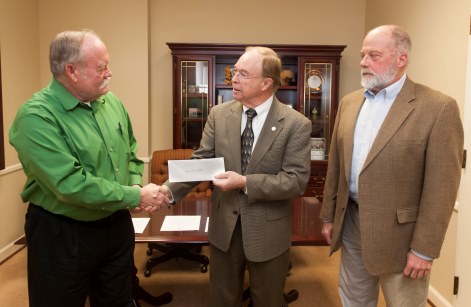 The Izaak Walton League of Lynchburg has established a fund to support University of Lynchburg’s environmental science programs with an emphasis placed on activities aligned with the league’s mission and properties.
The Izaak Walton League of Lynchburg has established a fund to support University of Lynchburg’s environmental science programs with an emphasis placed on activities aligned with the league’s mission and properties.
The group presented a $2,500 check to LC President Kenneth Garren during a signing ceremony on Jan. 28, 2015. The Izaak Walton League of Lynchburg plans to donate $2,500 annually for five years to this fund for a total of $12,500. Each year, $600 will go toward current programming and $1,900+ will go into the endowed fund until the fund reaches $6,000 at which point it will yield an annual income that can be used for programming.
The Izaak Walton League of Lynchburg is a part of the Izaak Walton League of America, a nonprofit national conservation organization whose mission is “to conserve, maintain, protect and restore the soil, forest, water and other natural resources of the United States and other lands.”
Established in 1941, the Lynchburg chapter has filled that mission through the development and maintenance of the Walton Park recreational facility, located in Amherst County. It covers 325 acres and includes a campground, creek, swimming and fishing lakes, picnic areas, playgrounds and shotgun, rifle, pistol and archery ranges.
The LC fund will support conservation research, course fieldwork, equipment and materials purchases, environmental education outreach and other expenditures associated with advancing environmental initiatives, including student stipends.
John Keegan, (at left) president of the Izaak Walton League of Lynchburg, said, “We felt to have an enduring impact on the environment and the training of our future environmental scientists, we should put in a place an endowment that will have … a long-term positive impact on the environment.”
The Environmental Science and Environmental Studies faculty of the College, in consultation with the dean of the School of Sciences, will have the authority to determine the use of the annual income from The Izaak Walton League of Lynchburg Fund.
Dr. Tom Shahady, professor of environmental science, already has ideas for initial work on the Amherst County property this semester. He plans to have students sample the refilled pond to assess the fisheries population. He also plans to incorporate the drained pond as part of his wetlands course. The class will delineate the wetlands, identify plants, produce a report and hypothesize wetland mitigation bank credits.

